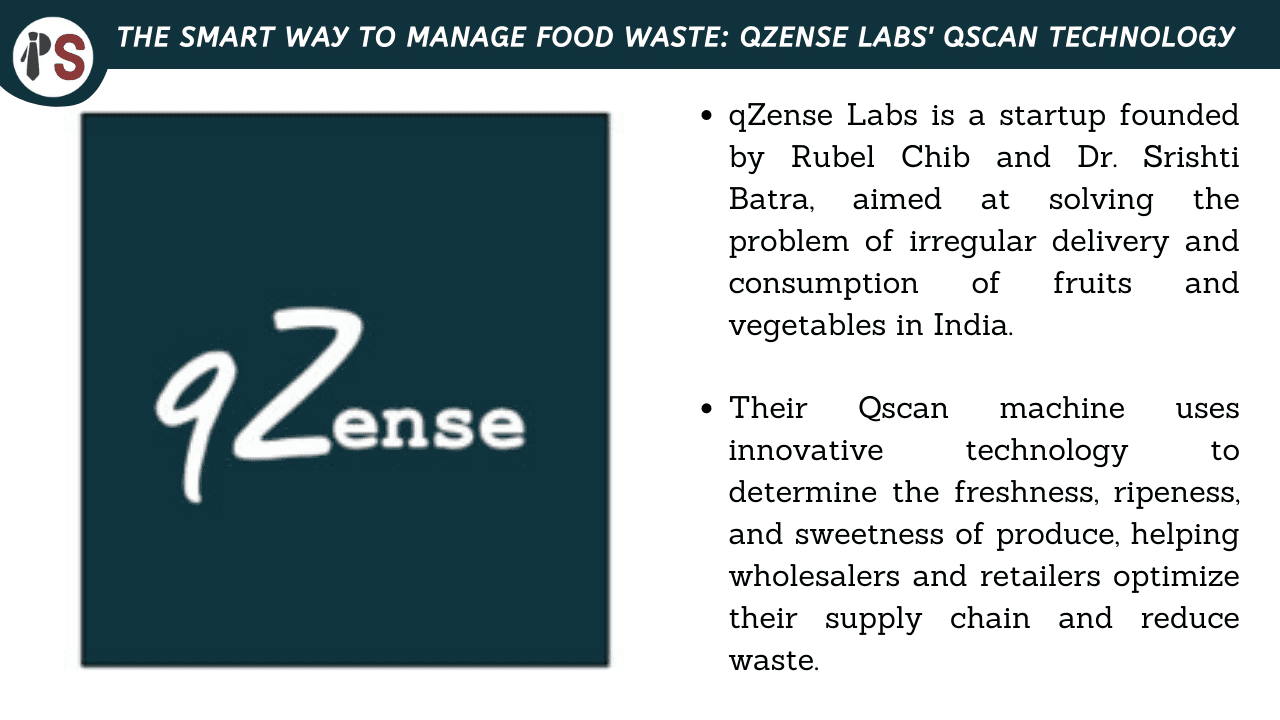
qZense Labs is a startup founded by Rubel Chib and Dr. Srishti Batra. Rubel is an experienced electronic engineer with a background in IoT projects, while Dr. Srishti has a PhD in computational biology. The startup is focused on solving the problem of irregular delivery and consumption of fruits and vegetables in India, which results in a loss of 92k crore rupees every year.
Their solution involves the invention of a machine based on Qscan technology, which is proudly made in India. This machine works on the principles of spectroscopy infrared and artificial olfaction and features a sensor array that can receive and evaluate different odors. It can determine the stage at which fruits and vegetables should be consumed, as well as the sweetness of the product.
AIM OF THE STARTUP
The startup was founded with the aim of revolutionizing the way we determine the quality of fruits and vegetables. Their mission is to provide a solution to the problem of irregular delivery and consumption of fruits and vegetables, which results in a significant loss of money each year.
Rubel Chib, an electronic engineer with experience in IoT projects, manages sales and marketing, while Dr. Srishti Batra, a Ph.D. in computational biology, is responsible for data analysis and innovative technology. Despite being eight months pregnant, Dr. Srishti drove to Bangalore to pitch their ideas on Shark Tank India, demonstrating her commitment to the success of the startup.
They plan to raise investment to implement a fully digitalized warehouse. The machine can determine the stage at which fruits and vegetables should be consumed and also calculates the sweetness of the product using a brick factor.
TARGET MARKET
The target market of qZense Labs would be wholesalers and retailers in the food industry. Their product, the Qscan machine, addresses the issue of irregular delivery and consumption of fruits and vegetables, which results in significant losses in the industry. The Qscan machine provides accurate information about the freshness and ripeness of produce, allowing wholesalers and retailers to optimize their supply chain and reduce waste.
Since the founders mentioned the need for a fully digitalized warehouse, it can be assumed that their target market includes large-scale operations with significant storage and transportation needs. This could include grocery store chains, food distributors, and large-scale produce suppliers.
qZense Labs targets a specific segment of the food industry that prioritizes freshness, quality, and efficiency in their operations. By providing accurate data and insights about produce, they aim to help their customers optimize their supply chain and reduce waste.
SALES AND REVENUE OF THE STARTUP
The Startup have sold 35 machines to date, with a making cost of around 15k and a selling price of 50k, resulting in a gross margin of about 35k per machine. During the financial year 2021, the company generated a revenue of 15 lakhs.
In the upcoming financial year, qZense Labs is looking to produce a sale of 5 crore based on their warehouse model, with a projected sales of about 20 crore. The company has already received investments from two investors, one of which provided 1.8 crore for the company's idea, and the other provided 5 crore.
In the month of December 2020 to January 2021, qZense Labs generated revenue of 24 crore, indicating a significant growth in sales. The current valuation of the company is 400 crore, which is impressive considering their initial revenue and sales numbers.
JOURNEY IN SHARK TANKS INDIA
The founders Rubel and Dr. Srishti offered a value of 1 crore (10 million) for 1% equity in their company.
However, the sharks had different opinions about the investment opportunity. Shark Anupam backed off, indicating that he would have considered the offer if the order of machines was significant. Aman Gupta expressed skepticism about the company's financial and accounting situation and didn't show any interest in the deal. Ashneer Gover also backed off, saying that the pitchers appeared to be there for fun rather than a serious investment opportunity.
Namita Thapar wished the pitchers good luck but did not make an offer. Vineeta Singh, on the other hand, countered the original offer by proposing a 5% equity stake in exchange for 1 crore. After some discussion, the pitchers made a counteroffer of 0.25% equity stake for 1 crore in the company.
However, the deal was not finalized, and Vinneta Singh ultimately rejected the offer. It is unclear why Singh did not agree to the deal, as the provided information does not indicate the reasons behind her decision. Nonetheless, the funding attempt by qZense Labs on Shark Tank India did not result in a successful deal.
At Professional Saathi, we offer a range of business consultancy services that help businesses improve their performance, achieve growth, and overcome challenges.
Copyright 2026 © Created By KTPG PROFESSIONAL SAATHI CORPORATE CONSULTANT PRIVATE LIMITED, All Rights Reserved.
Leave Your Comment